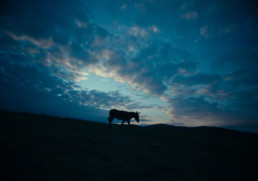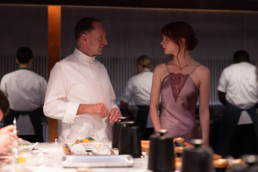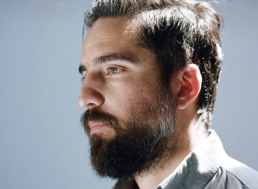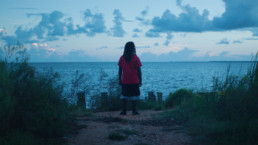'EO' is a Stunning, Emotive Arthouse Gem
EO is a future classic. Declaring its imminent legacy might seem premature to some, but it feels wholly appropriate after having witnessed the film's singular, spectacular vision. 84-year-old director Jerzy Skolimowski's film about a wayward donkey tells a story not just of human nature and goodwill but the reality of detachment and survival. Stark imagery combined with a pitch-perfect score and sound design, EO is a truly unforgettable piece of filmmaking.
Running just 88 minutes long, the film opens with a mesmerizing shot of EO and his handler performing one of their routine circus shows under the big top. Lights are flashing, the crowd is cheering – it's disorienting but impossible to look away. EO remains calm under the pressure. Outside of the circus, however, local activists confront the traveling show with broad claims of animal abuse and rip EO from the comforts of his environment, taking him away from the only home and people he has ever known. He is boarded with the other animals and driven all over Europe for days before he is eventually dropped off at a barn in an unfamiliar destination.
Despite being "freed", EO is restless and longs for the routine and the personal attention he received from his circus handler (Sandra Drzymalska). Without words, EO conveys his determination to change his circumstance through action as he escapes the barn and begins his journey back through the Polish and Italian countryside, encountering highs and lows–cruelty and kindness–in equal measure.
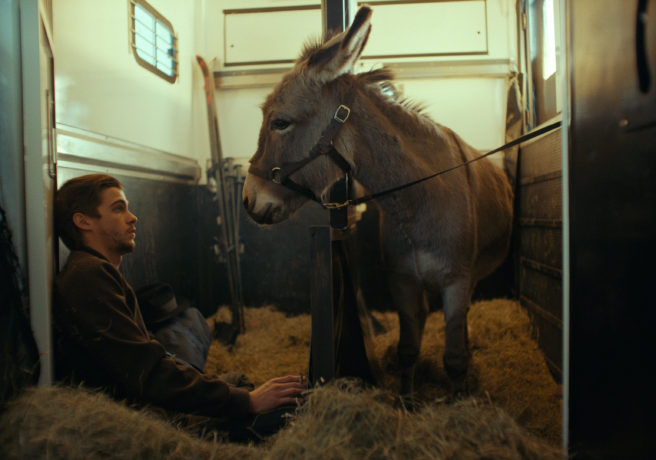
The protagonist of the picture, a gray Sardinian donkey named Tako, is the heart of the film. His expressive eyes and cheeky personality convey so much through subtle movements and melancholic grunts. Six donkeys were used throughout the filming process, and it's been made clear that no animals were harmed in the making of the film.
Aiding EO's valiant journey is the sweeping, full-bodied orchestral score from Polish composer Pawel Mykietyn. Mixing classical symphonic melodies with more contemporary, synth-based electrics, EO's score is a fusion of operatic peaks and gentle ambient soundscapes. Sound in general is heightened throughout EO, from visceral ADR to intimate ASMR, our senses tingle in every scene.
After many successful festival runs, including Cannes (Jury Prize winner, Palme d'Or nominee) and the European Film Awards (European Original Score winner), EO has continued to have a strong hold on me. Tenderly told with striking visuals and a ruminating score, EO deserves a top spot in the modern arthouse canon.
Distributed by Janus Films. 88 minutes. Not rated. Opening at the Los Feliz 3, Alamo Drafthouse DTLA, and Laemmle Royal this Friday, December 2, 2022.
'Good Night Oppy' Tells An Unexpected Love Story Between Man and Machine
If the rock scene from Everything Everywhere All at Once – you know the one – unexpectedly brought a tear to your eye, make sure you bring a box of tissues to Good Night Oppy. Having its world premiere at the Telluride Film Festival before playing at TIFF, this documentary tells the true story of two NASA robots who defied the odds by surviving nearly 15 years longer than expected. See how I used the word "surviving"? I almost wrote "living" which, as we all know, inanimate objects cannot be considered living things. But director Ryan White gives us reason to pause as we can't help but form an emotional attachment to these autonomous rovers over the course of the film.
In 2004, the Mars Exploration rovers Opportunity and "twin sister" Spirit landed on opposite sides of the foreign planet. The goal coming out of NASA's Jet Propulsion Laboratory in Pasadena, CA was to determine once and for all if there was neutral water on Mars, furthering the possibility of life. A team of scientists and researchers spent years developing rovers that could investigate the Red Planet and communicate back to Earth through complex tech systems. Opportunity and Spirit were built to have a life expectancy of 90 days. So, imagine the excitement when both rovers made it to day 91 and the disbelief when they hit the one year mark, and so on until nearly 15 years later.
Of course, Good Night Oppy is only as sentimental as you allow yourself to get as the viewer. Imagine the *Criterion-selected* film Wall-E come to life – if that film tugged at your heartstrings, be prepared for a similar feeling with Oppy. Featuring photo-real special visual effects and animation by Industrial Light & Magic, the visual effects company founded by George Lucas, Good Night Oppy has that classic Star Wars look: rich and stunning.
The story at the heart of the film is the quintessential American Dream. A team of scientists from around the world come together to propel US space exploration into the future, quite literally reaching for the stars. Good Night Oppy offers audiences old-fashioned, feel-good optimism and stands as a testament to just how powerful inanimate objects can be when personified by humans.
Distributed by Prime Video. 105 minutes. Rated PG. Available to stream on Amazon Prime Video on Wednesday, November 23, 2022.
This review originally ran on September 23, 2022 during the Toronto International Film Festival.
'The Menu' Serves a Slice of Humble Pie to Elitist Eaters
The world of fine dining is an elusive one. The thought of spending a month's paycheck on a meal–regardless of how many Michelin stars it has–feels like a blasé act reserved for the affluent community (and the affluent community alone). So, when the opportunity arises to enter into the world of elitist eaters for one unforgettable night, of course, one would jump at the opportunity. What could possibly go wrong? Turns out, a lot. Director Mark Mylod's (Succession) satirical thriller The Menu puts a clever spin on the "Eat the Rich" anecdote that, while mesmerizing to look at with the right amount of humor, leaves us wanting more.
Margot (Anya Taylor-Joy) and Tyler (Nicholas Hoult) are a well-off and stylish couple who are about to embark on the experience of a lifetime: partake in a lavish tasting menu from the globally-celebrated Chef Julian Slowik (Ralph Fiennes). From the onset, the couple gives an "oil & vinegar," "opposites attract" vibe; an apathetic Margot in her black leather jacket tries to stay interested as she listens to an overzealous Tyler talk about what they can expect at Hawthorn, the exclusive restaurant on the remote island they are heading towards. With tickets in hand for this once-in-a-lifetime dining experience costing thousands of dollars (which a sensible Margot immediately views as suspicious) the couple, along with a handful of other guests, board the charter boat headed to fine dining mecca.
Awaiting them on the island is the reclusive Chef Julian Slowik, manager Elsa (Hong Chau), and their obedient staff, who have prepared a luxurious night for the special guests. Along with Margot and Tyler are boisterous tech bros, Bryce (Rob Yang), Soren (Arturo Castro), and Dave (Mark St. Cyr), well-mannered repeat customers, Anne (Judith Light) and Richard (Reed Birney), arrogant restaurant critic Lillian Bloom (Janet McTeer) and her minion editor Ted (Paul Adelstein), an aging movie star (John Leguizamo) and his assistant Felicity (Aimee Carrero). It's a cornucopia of egos and entitlement, to which Margot is definitely the odd woman out. Once seated in the minimalist open-concept kitchen and dining area, the guests are treated to avant-garde creations that are both wacky and genius. "Bread is food for the poor," laments Chef, so he offers his guests a bread basket with no bread. Confused but engaged, the guests embrace the theatrics of the Chef's multi-course menu. However, things take a dark turn when a sous chef commits suicide as part of the menu and the guests realize that danger is served.
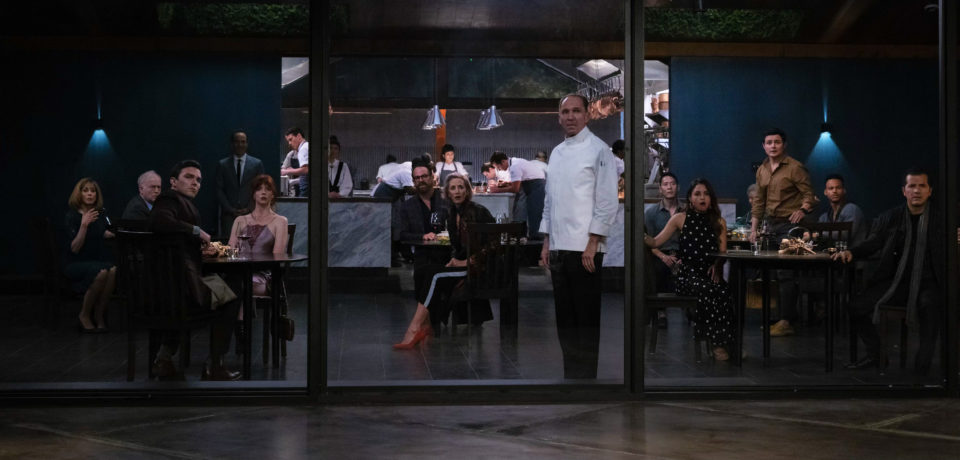
The Menu has a cheekiness that feels both fun and dark; there are moments that are laugh-out-loud funny–mostly due to Ralph Fiennes' *chef's kiss* performance– while other moments exude heightened tension. The containment of the characters on the remote island with no working wifi or plausible escape route works in the film's favor and builds suspense and a sense of dread almost immediately. Adding to the film's robust tension is the score from celebrated composer Colin Stetson (who created the eerie soundscape for Hereditary).
Director Mark Mylod pokes fun at food culture not just within the story of The Menu, but in how the film is structured. Before the film begins, a title card acts as an invitation into this elitist culinary experience, welcoming audiences to the event that is to unfold. An obvious inspiration is also the David Gelb-helmed Netflix series, Chef's Table. Some shots pay homage to the show by mimicking how the distinct courses are framed, described, and lusted over by eager foodies.
However, what falls short is the story itself. The execution is fully-formed, but the plot feels half-baked. The biggest question I was left with after viewing was "Why?" Why this group of guests? Why did Chef choose this night? Why that grand finale? Perhaps answers to those questions would've helped provide answers to another qualm I have about the inadequate backstory. The characters deserved more backstory, especially Tyler who-contrary to what the poster implies–is not a main character. I'm aware that what I'm going to say next is purely a personal preference but I also wasn't convinced Anya Taylor-Joy was the right actress for this role. It felt as if she was going through the motions. In this role, she lacks the charisma and power that is needed when acting against Ralph Finnes, making for an off-balanced output.
Ultimately, for as beautiful and stylish as it is, The Menu leaves a mediocre aftertaste. If you're looking for an "Eat the Rich" film, I suggest The Menu be your appetizer and Triangle of Sadness be your main course. Perhaps Bones and All can be dessert.
106 minutes. Rated R. 'The Menu' is now playing in theaters.
Chanda Dancy Premieres Track From ‘Devotion’
There's a scene in director J.D. Dillard's upcoming aerial war epic, Devotion, that completely caught me off guard. Navy officer Jesse Brown – played by a mesmerizing Jonathan Majors – stares intensely at his reflection in the mirror at base camp. It's quiet, eerily so, until composer Chanda Dancy's ruminating score takes hold of the scene and pushes Jesse to the verge of a total breakdown. The restraint in this pivotal moment of character development could be viewed as risky to some, but it's the delicate attention to detail and subtext that makes this war drama sound unlike other films in the genre.
Based on the bestselling book of the same name by Adam Makos, Devotion tells the inspirational true story of Jesse Brown (Majors), the first Black aviator in Navy history, and his comrade and friend, Tom Hudner (Glen Powell), as they set out to fight in the Korean War at the start of the 1950s. The film depicts a brutal reality – one of hardship, loss, and hate – while also keeping the themes of brotherhood, sacrifice, and love close by. It's a rich film full of high moments, tragic realizations, and everything in between – all of which are encapsulated in Chanda's emotive orchestral score.
Cinemacy is excited to premiere “The Lighthouse”, from Sony Pictures and Black Label Media’s Devotion, below:
Much like the fighter jets in the film, "The Lighthouse" soars through a symphony of melodic strings and EDM synths. Chanda brings the audience into the cockpit of the plane by using sounds that resemble engines, wind, and other elements of flight. Speaking about her creative process, she explains, "Love is everlasting - love for your friends, love for your family, love for country, and love for your fellow human. That is the true meaning of Devotion, and I wanted the score to reflect that. From the elation of flight in “The Lighthouse”, to tender love for a wife in “A Gift For Daisy”, true friendship in “Be There For Them”, duty to country in “Procedure”, and the very essence of standing up and showing up for others in “Measure Of A Man”, I hope to give the listener a sense of these emotions, and in turn, a glimpse into the lives of Jesse Brown, Daisy Brown, Tom Hudner, and the aviators of U.S. Navy VFA-32."
Chanda started composing orchestral works at the age of 12 and is an alumnus of both the USC Film Scoring Program and the Sundance Composers Lab. Her most recent project, the documentary Aftershock, won the Impact for Change award at the 2022 Sundance Film Festival in addition to being nominated for the Grand Jury prize. Her 18+ years of experience in the film and TV space has not gone unnoticed in the music community, as Anthony Parnther, conductor of the San Bernardino Symphony, confidently states that Chanda is “quickly gaining recognition as a foremost black American contemporary composer.” Her next project is scoring the upcoming Whitney Houston biopic, I Wanna Dance with Somebody.
Lakeshore Records is releasing the ‘Devotion’ Original Motion Picture Soundtrack on Friday, November 18th. Listen to the album here.
‘Devotion’ opens in theaters everywhere on Wednesday, November 23rd.
'Utama' Elegantly Depicts The Honoring of Family Traditions
Utama comes into my life at a time when I'm feeling extra sensitive toward the importance of honoring family traditions passed down from older generations. One's legacy can be appreciated while still earthside, but it's especially in death when their physical absence is felt, does their impact realize itself. Life, death, and how we spend the time in between is the thesis statement of writer-director Alejandro Loayza Grisi's subtle yet remarkably powerful debut feature, Utama.
Immediately taken by the colorful garments set against a dry and dusty landscape, we're transported to the Bolivian Altiplano, home of elderly Quechua couple Virginio and Sisa (José Calcina and Luisa Quispe). Presumably, in their late eighties or so, the couple spends their days following the same simple routine: he manages the llamas and she walks to town to gather water.
However, when their only source of drinking water goes dry, the effects of this ongoing drought begin to have real consequences for the townspeople. It doesn't help that Virginio is secretly battling a mystery cough, and a lack of appropriate resources like water could cause him grave danger.
Amidst the troubling prospects, Virginio and Sisa are in for a surprise when their grandson, Clever (Santos Choque), shows up at their remote home. His hope is that he can convince his grandparents–specifically his bullheaded grandfather–to move with him to the city where water and resources are boundless.
https://www.youtube.com/watch?v=WmI3R__51Qc
But Virginio is offended by Clever's good-natured offer; he won't accept a handout, even from his own family. Virginio's stubbornness and loyalty to tradition are at odds with Clever's more progressive way of life. His unwillingness to adapt ultimately does more harm than good to his family.
Utama, which literally translates to "our home," is a tightly packaged, slow burn of a film that radiates with a heart both onscreen and off. Alejandro Loayza Grisi's portrait of a struggling community proves to be as devastating as it is breathtaking.
Loayza Grisi's respect for the people and the culture is apparent from the very first frame, as we get swept up in the picturesque visuals and unique sounds of Bolivia. The decision to use non-actors, José Calcina and Luisa Quispe, further grounds the film in its reality, almost teetering on the feeling of a documentary.
An elegant depiction of honoring family traditions and their impact on future generations, Utama is a beautifully crafted film that radiates with sincerity.
This review was first published on Jan 25, 2022 as part of our Sundance Film Festival 2022 coverage.
Jimmy LaValle Shares Track From 'Something in the Dirt'
It's always a eureka moment when you discover a new film or filmmaker that you believe will be the industry's next big breakout. Sundance is known for bringing a plethora of both established talent and artists on the rise to its festival lineup, which is accessible to all via its virtual screening platform. As you're watching from home, look deeper into these independent gems and you'll find there is so much to be discovered sonically as well, like composer Jimmy LaValle and his score for the sci-fi horror film Something in the Dirt.
Directed by Justin Benson and Aaron Moorhead (Marvel’s Moon Knight), Something in the Dirt is described as an oddball, twisted talkie with supernatural tendencies. Using this as his reference, LaValle uses synthesizers and various tonal effects to bring a nuanced palette of textures and dense, evocative atmospheres to this sci-fi feature.
Cinemacy is thrilled to premiere “Is that Morse Code?" from Something in the Dirt.
Jimmy LaValle has been releasing music as The Album Leaf since 1999, and much like his synth-forward, electro-musical moniker, LaValle continues to explore the boundaries of sound in his film compositions. His music defies easy categorization, much like the minimalist composers and sound manipulators he considers idols like Philip Glass and Cliff Martinez. LaValle is carving out a niche in the music industry with his signature style that creates soothing melodies that are highlighted by jolts of unexpected dissonance. He continues to explore the unlimited horizons of sound and composition with his film soundtracks.
To hear more of LaValle's score, check out Something in the Dirt, opening this Friday at AMC Theaters.
This article was originally published on January 24, 2022, during the Sundance Film Festival
'Brainwashed: Sex-Camera-Power' Exposes the Male Gaze in Film
Nina Menkes is not only one of America’s earliest independent filmmakers but is also considered a cinematic feminist pioneer. Her first feature, Magdalena Viraga (1986) tells the story of a prostitute who gets sent to prison for killing her pimp. The film went on to win the Independent/Experimental Film and Video Award at the Los Angeles Film Critics Association Awards that same year. Since her bold debut, Menkes has spent the last 30+ years observing a disturbing trend within the film industry, which she exposes in her latest documentary, Brainwashed: Sex-Camera-Power.
Playing like a TED Talk, Menkes takes the stage in a packed auditorium to discuss the nuanced but damaging gendered politics of shot design. She opens her argument by playing a clip from Bladerunner 2049 (2017), that infamous scene where a naked Ana de Armas interacts with Ryan Gosling. Over the course of the film's hour-and-a-half runtime, clips like these will prove her hypothesis that shot design is gendered, and males are consistently shot differently than females. Welcome to feminist film school 101.
As Menkes shows, being a filmmaker also means accepting a great level of responsibility. What you create has an effect on those who watch your movie. And for too long, women have been treated less than or objectified more than their male counterparts.
Aiding in Menkes' theory is Laura Mulvey, the film theorist who coined the term the "Male Gaze." Mulvey, alongside film school professors, psychotherapists, and film directors, all contribute stories from their first-hand experiences of misogyny in the industry that has a love/hate relationship with women.
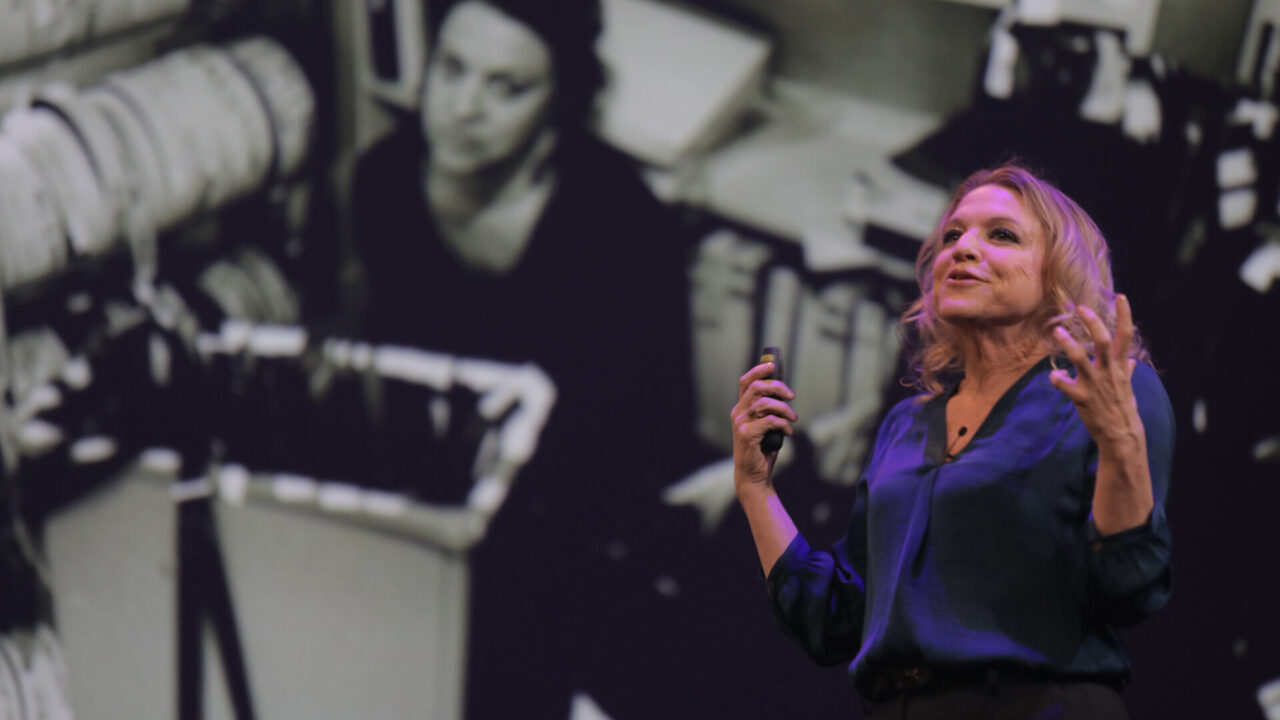
Using over 175 film clips from Hollywood blockbusters and cult classics, Menkes points out how simple, subtle techniques like framing and lighting can disempower women on the screen. For example, women are countlessly shot in fragmented ways, like close-ups on breasts, hips, and butts while men are usually always shot full body (even in hyper-sexualized films like Magic Mike). Another point, slow-motion has been consistently used on women to emphasize sexualization or victimization, whereas it's used on men to emphasize action scenes and toughness.
Menkes calls this a vicious triangle of repeated torment: the visual language of cinema can lead to employment discrimination against women which can lead to sexual abuse/assault. All that to say, what we see on screen has real-life consequences, "If the camera is predatory, the culture is predatory as well."
Although the points Menkes addresses are hard to hear (at times I even found myself wanting to defend these films), her points are indisputable. Watching her criticize scenes from some of my favorite films like Phantom Thread, Contempt, and Eyes Wide Shut (okay, that one may be obvious) made me feel uncomfortable–but that's the point. Brainwashed: Sex-Camera-Power is provocative on purpose. Its whole purpose is to shake up the industry to the subliminally victimizing messaging that we've been watching and accepting for far too long.
This review originally ran on January 26, 2022, during the Sundance Film Festival.
107 min. Distributed by Kino Lorber. In theaters this Friday, October 21st, aia Kino Lorber at DCTV's New Firehouse Cinema in NYC and the Laemmle in LA.
'Descendant' Uncovers the Last, Secret American Slave Ship
In her latest film, Descendant, documentary director Margaret Brown points her lens at a decades-long mystery that has cast a shadow on the small Africatown community of Mobile, Alabama.
For generations, residents of the blue-collar town–which was founded by enslaved ancestors–have passed down a sordid oral history of their origin story. Namely, the kidnapping and selling of their ancestors to slave owners back in the 1800s.
What Margaret and her film crew are here to investigate is a local legend that the last known slaving vessel brought to America in 1860–an illegal ship called the Clotilda–is still buried somewhere off the coast of the town of Mobile.
Direct descendants from the Clotilda never gave up hope that one day, the missing ship would be recovered. Although they had no physical evidence to prove that the Clotilda was so close, word of mouth passed down from generation to generation kept its history and memory alive.
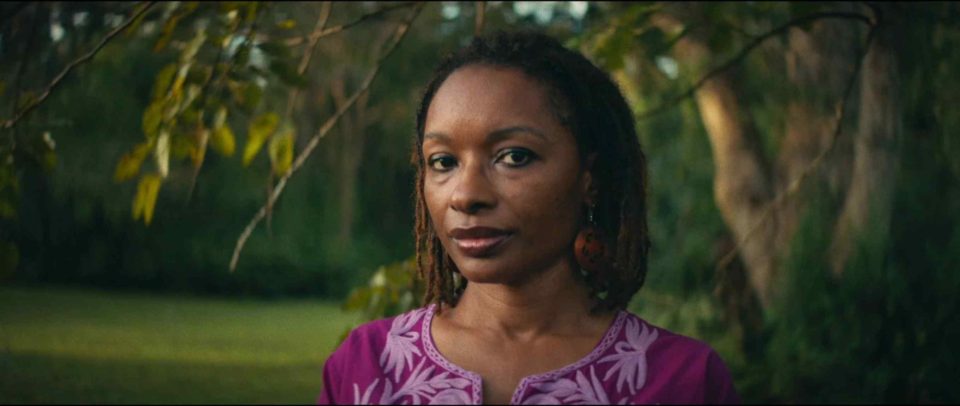
The community was in shock when the government agreed to search for the ship in 2018, and it was a miracle when the ship was, in fact, found. As we come to discover, the captain and other men who were engaged in this illegal activity tried to hide their reprehensible act by sinking and burning the slave ship. And it had been kept a secret for over 100 years.
“Many black people don’t know who they are,” says one of the Africatown residents, a heartbreaking fact to comprehend. There are many Americans whose family history has been forever lost due to intentional destruction at the hands of slave owners and other abusers. While that’s a devastating reality, how the community of Mobile, Alabama chose to persevere through hardship is admirable, and is a true testament to their strength and spirit.
One of the strongest scenes from Descendent comes toward the end when a direct descendant of the slave ship captain meets the direct descendants of the slaves his family trafficked over 100 years ago. It’s highly emotional for all involved, but shame is quickly met with grace and forgiveness. I don’t think I’ve ever seen such an act of strength shown onscreen before.
In addition to highlighting a community that is totally deserving of a platform to finally tell its story, Descendant also pays homage to the earliest days of storytelling. Before technology, stories were passed down verbally; a total oral history. Now, we rely on visual mediums to communicate and remember our special moments. Descendant proves that history can never be erased if we continue to talk and share our stories, no matter how deeply a secret may be buried.
Distributed by Netflix. 108 min.
In Theaters and on Netflix this Friday, October 21st.
This review originally ran on January 27, 2022, during the Sundance Film Festival.

